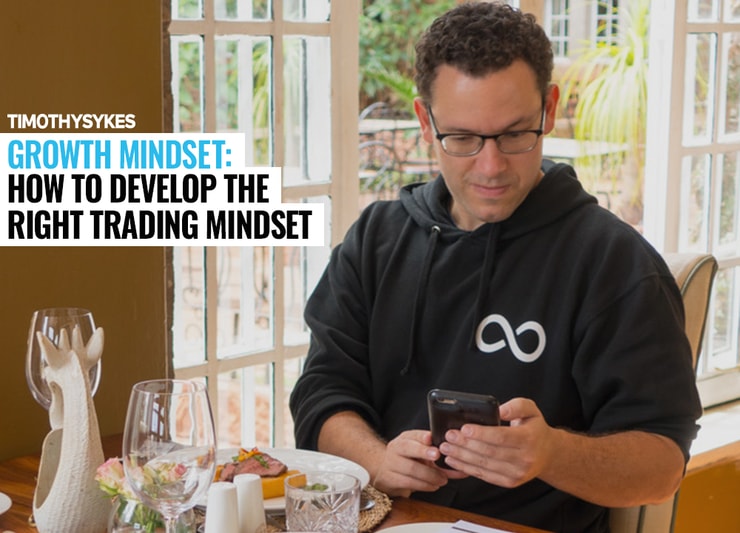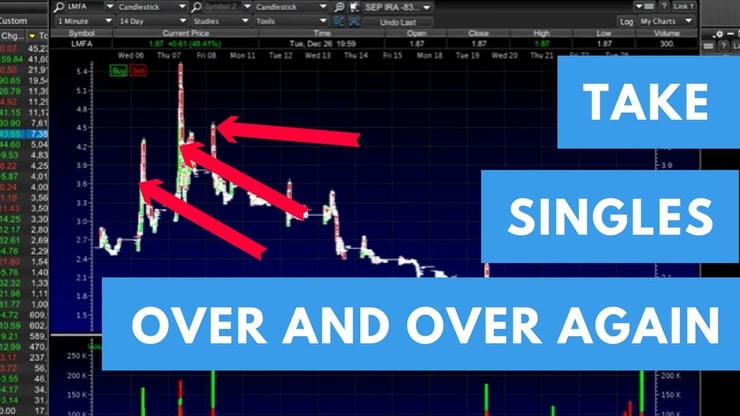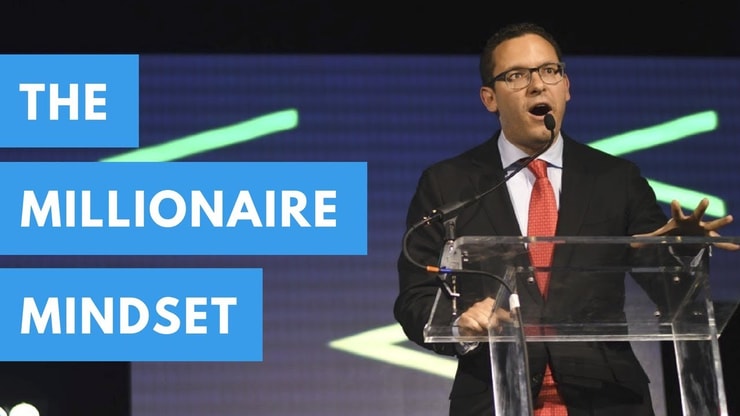Today, let’s bust out some cool psychology stuff to help with your trading education. This is gonna be fun. Some of my top Trading Challenge students swear by this stuff — they say it totally changed their game.**
I’m a big fan of this topic and firmly believe it’s one of the most important things in trading and life in general. Believe and achieve. OK, let’s roll!
In 1988, Dr. Carol S. Dweck, a psychology professor who now teaches at Stanford, published a research paper explaining how people’s beliefs in their own intelligence played a significant role in their motivation, willingness to work hard, and achievements.
In that paper, Dweck concluded that if you believe, you can get smarter — if you believe in your own abilities, you’re willing to put the necessary efforts to learn.
Bottom line: When you believe, you achieve.
On the other hand, the same research shows that if you believe you can’t get smarter … if you believe intelligence is a fixed trait you can’t change … then you’ll never achieve your full potential.
So basically, if you don’t have faith in yourself, then you’ll probably achieve much less than you truly can.
Those conclusions brought new light to the understanding of mind and achievements and coined the terms “growth mindset” and “fixed mindset,” which I’ll explain more in this post.
Psssst! Have you realized how closely those terms relate to your trading success?
Do you want to find out how?
Then let’s look at what a growth mindset is, and if it can really make or break your trading career.
Table of Contents
What Is a Growth Mindset?

2025 Millionaire Media, LLCA growth mindset (or growth mentality) is believing you can develop your talents over time through “hard work, strategies, and input from others” — to use Dr. Dweck’s words.
In stock trading, I’d change those words to “consistent study, a trading plan, and mentorship.”
People with a growth mindset tend to achieve more …
They believe they can improve. They recognize success takes hard work. So they’re willing to work for it.
They also tend to get better results, which strengthens their beliefs.
It’s a cycle that reinforces itself. And if you think about it, it makes sense.
If you believe you’ll learn and be successful in trading — and you’re motivated by the payoff — you’re going to make an effort.
I see this confidence in my great students, those constantly improving their knowledge of patterns and the market. They develop a keen eye for spotting opportunities …
… And there’s no better positive reinforcement than winning.**
Let’s talk about the ‘naturals’ — those with innate talent. That raw talent may be impressive, but they gotta work for success, too.
I’ve seen people with the best of abilities fall short because they just won’t work for it or they can’t commit.
And I’ve seen people with average skills find success. Maybe they don’t have superstar status. But they make a living, and that counts for plenty.
Here’s the good news for traders: You can help develop your trading skills by adopting a growth mindset.
No catch. You just need to believe in yourself, be willing to work hard, and surround yourself with the right people.
You’ll see why in a bit …
Benefits of Having a Growth Mindset
A growth mindset can make or break your success.
Why?
Because to become a successful trader, you’ll have to do things not everyone will do.
You have to study hard, develop the right processes, and keep learning — from your own experiences and from others. Never hesitate to learn from the traders who’ve gone before you.
Trust me, I know these things aren’t always easy.
You have to believe it’s possible. Then you have to put in the effort.
Your beliefs come first: Internalize that trading for a living is a real possibility for you.
After many years of trading and teaching, I realized that the reason most traders lose money in the market is because they lack the commitment to learn. And they don’t believe they can win.
A lot of these traders would rather gamble than dedicate themselves to learning the craft of trading. They chase after ‘hot’ stock tips, rather than work to become self-sufficient in trading.
If you want to be successful in trading, you have to change your mindset. It’s not about getting rich quick. It’s honing a skill — and that takes time and dedication. Period.
Growth Mindset vs. Fixed Mindset
So what’s a fixed mindset? That’s the belief that talents or abilities are innate, static …
Growth and fixed mindsets are completely different mentalities. No kidding, right?
We shouldn’t underestimate innate talent. But in most cases, it plays a minor role in success.
Sure, it’s better to have innate talent, but you won’t get anything out of just having it. You gotta do the work!
Think about this … how many people with great talent waste time and don’t take full advantage of their own abilities? Some might even be considered lost causes.
My point: You can find people with little innate talent who do the work. Their efforts and commitment pay off. They’re competent and successful.
They possess the growth-mindset characteristics their peers lack.
In the book “Outliers,” Malcolm Gladwell mentions the 10,000-hour rule. It can take up to 10,000 hours of “deliberate practice” to become world-class in any field.
And good news, people! You don’t have to be a rockstar trader to make money. You just need to be competent enough in trading to hit consistent gains.
Be smarter than the gamblers. Do the work. Learn from others who do the work and have success.
How to Develop The Right Trading Growth Mindset in 5 Stages
Now that you understand it, let’s talk about how to develop a growth mindset.
But before I get into specifics, I want to remind you that this is something pretty much anyone can do.
It’s a lot of work, of course, but totally doable.
A lot of people who sign up for my Trading Challenge started off as total newbies. And guess what? Some of them have built successful trading careers.**
No matter your background, trading could be just the thing you’ve been looking for.
So pay attention! Because now I’m sharing tips on how to develop your growth mindset.
More Breaking News
- Core Scientific Unexpected Surge: Could Acquisition Boost Growth?
- Core Scientific, Inc. Eyes Potential Acquisition by CoreWeave
- Quantum-Si Announces $50M Stock Offering Amid Financial Shifts
#1 – Small Gains Add Up Over Time
The first step in developing a growth mindset is building it bit by bit.
It takes time. Consistent successful trades don’t happen overnight. It’s a process.
As with any profession, there’s a learning curve. And yeah, no one really wants to stick the curve. We want results, and we want ‘em now.
But the get-rich-quick fantasy is just that: a fantasy.
So take your time. Work through the steps. Educate yourself.
When you start trading, you usually risk only small amounts of money — losses really are a part of the game. They can teach you valuable lessons.
So you’ll probably see mixed results as a beginner: small losses, small gains. But if you stick with it, you might find consistency and can then work on growing your account.
Once you’ve developed some consistency, next thing you know, you could be prepared for bigger trades. But never trade too big. Stay safe! Remember, Small gains add up over time.
If you know my trading style you already know that I seek small gains. I seek 10%, 20%, maybe 30%, and cut my losses quickly. I don’t want to take big risks.
Sometimes there are penny stocks that go up 50%, 100%, or more. And I miss the full stock run because I take profits quickly.**
But, again, I prefer to be consistent with smaller gains and manage my risk.
#2 – Practice, Practice, Practice
What kind of practice? Glad you asked …
I mean studying, trading, and learning with commitment and discipline. It’s a holistic approach toward all aspects of your learning process.
For example, you already know I don’t recommend overtrading.
In fact, I don’t ever recommend that you trade unless you’re 100% prepared and ready to jump in. That means trading only the best patterns.
But you should find a way to be involved in trading every day. I’m not saying “always trade with funds from your trading account.” No way! Some days there won’t be any good patterns or setups, and if you don’t have those important catalysts, then don’t trade! Many of us don’t trade every day. Don’t do it unless you’re certain.
So what do you do then — especially if I’m telling you to be in involved in trading every day? Practice with paper trading (here’s how to do it). Set a time to study patterns, research the market … whatever works for you and keeps you engaged. Whatever you do, do SOMETHING.
As a trader, you have to learn to trade in different environments …
Bull markets. Bear markets. Periods of low volatility or high volatility.
You’ll also trade different directions, long and short, and different patterns. Be familiar with all of them. Study. Practice.
The more you practice, the faster you can grow your level of trading competence.
And that can potentially lead to growing your trading account — even with step-by-step small gains.
#3 – Observe Your Progress Over Time
When you learn and trade with discipline, you’ll see your progress over time. That can translate into more confidence and better results.
This is a process that reinforces itself. And that’s exactly what a growth mindset is about.
However, to observe your progress, you first need to learn from your own trading — including your losses. This a key step in the process.
Remember that your losses will be some of your best teachers. When you learn from them, you can avoid costly errors and help protect your capital.
A critical turning point is when you learn to turn your losses into gains …
Take a moment to soak that in: At that point, you’ve become a dedicated student who trades only the best opportunities.
From there, keep moving forward.
#4 – Observe the Habits of Successful Traders
Of course you’ll learn from your own trades — but you can also learn from other successful traders.
Why? Successful traders are already getting the results you want for yourself. It just makes sense to learn from them. It can speed up your development.
When you study successful people, you might notice that they share many traits and habits.
The same applies to successful traders. Their habits give them an edge for success in the markets. You need to do the same.
You have to master stock patterns. Set and follow a trading plan. Make time to review your trades and learn from them. Work with a mentor. Learn others’ strategies and develop your own.
Successful Trading Growth-Mindset Examples
Traders come from diverse backgrounds. Some have no experience when starting, yet find a way to build toward trading success.
Take some of my top Trading Challenge students …
They all developed a growth mindset. They reportedly started with or little or no experience, little money, and became successful traders.**
Of course, their results aren’t typical, but they share something in common …
They believe in themselves. They’re eager to learn and have a mentor. They commit to their own success with hard work.
#5 – Always Seek More Knowledge
Of all the growth-mindset characteristics, your beliefs and an insatiable appetite for learning are key.
Learning is an ongoing, forever process. I’ll say this over and over: Never stop learning!
Some people say the day you stop learning, you basically die. I follow this credo.
Take everything you learn and let it grow and evolve. Apply that knowledge to different trading scenarios.
Think about multiple outcomes. A pattern you successfully trade today might not work tomorrow. Stocks or sectors with ripe with opportunity today can be barren tomorrow.
And, again, learn from successful traders. They can potentially help you shorten your learning curve. They were once where you are now.
But buyer beware! There are a lot of fakes out there … so be careful when choosing a mentor.
Invest your time in learning from the right people: Successful, legit traders, and students with a growth mindset.
Trading Challenge
If you believe in the importance of a growth mindset, I want to invite you to apply to my Trading Challenge.
This is the closest way you can learn from me and my top students! We’re in the trenches with you, and we want you to succeed.
You get access to me and all my resources, trades, commentaries, webinars, and more. It’s the ultimate way to communicate with other traders, get tips, share your plays, and learn from others’ successes and failures.
Even in the process of simply applying to my Challenge, you can learn about trading penny stocks. Apply now and you’ll see what I mean.
Key Growth Mindset Tips for Traders
There are a few more growth mindset tips I want to share with you …
Use them to help you set a framework and expectations for this process.
Set Up Your Own Trading Rules
Planning and strategy are critical to developing a growth mindset.
You’ve learned here that you have to believe in yourself and also be willing to work hard. But without planning and strategy, you’ll go nowhere fast.
So, when you enter a trade, you’ll execute a predetermined trading plan. Every single trade. Every time. (Here’s how you create a trading plan.)
In that plan, you set your own trading rules: the types of stocks and patterns you’ll trade, the risk/reward ratio, your position size, entry and exit points, etc.
Your plan is your set of rules. It provides structure, and structure can boost confidence. Always trade with a plan — always!
Develop Realistic Expectations
It’s a marathon, not a sprint …
To become a great trader, you have to develop realistic expectations.
Even traders who turned small accounts into huge profits did so it over the course of years — not days, not weeks, not months.**
Be willing to work hard and learn from your mistakes. Recognize that solid success can only be built step by step. Have patience, study hard, and trust the process.
The Bottom Line
As you’ve learned here, a growth mindset plays a fundamental role in your trading.
You have to believe you can do better, that you can learn more.
If you don’t already have it, developing a growth mindset won’t happen overnight. It can take time to strengthen your beliefs. The more you study and practice, the more you’ll help yourself develop your growth mindset — it goes hand in hand.
Seek out mentors and great traders. They’re out there, and many are happy to share their wisdom. No matter where you are, you can find someone who knows your path.
But if you think you can’t succeed, you’re setting yourself up for failure … so knock it off and do whatever it takes to change your life. Why live scared? Do something amazing with your life.
What are you waiting for?
I want to hear from you! Do you have a growth mindset? Do you think your beliefs can influence how well you do in the markets? Tell me about it …











Leave a reply